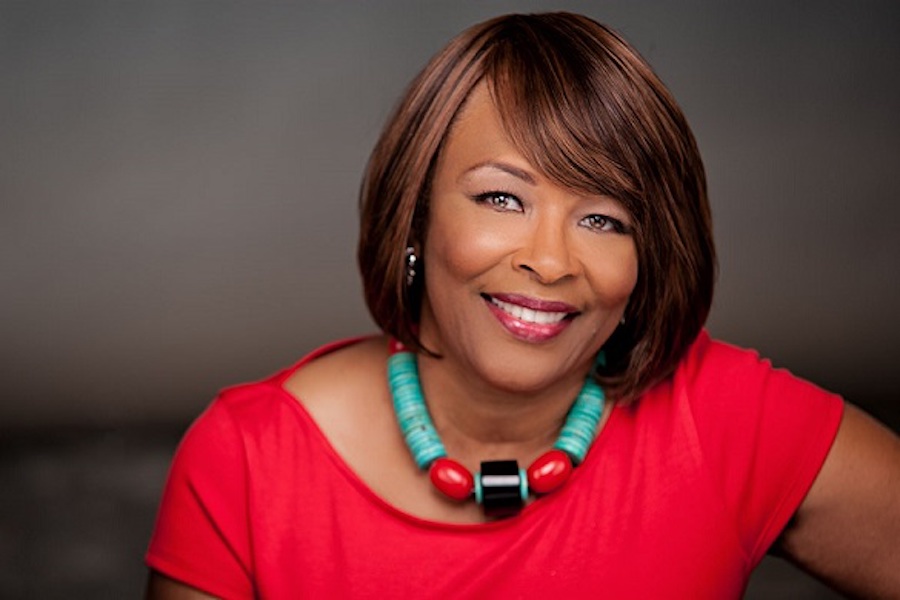Each week in Maria’s weekly newsletter publication The Sunday Paper, we honor individuals who are using their voices, their hearts and their minds to Move Humanity Forward. This month, in recognition of Women’s History Month, we want to honor incredible women who are serving on the frontlines of humanity.
This week, we honor Betty Lamarr as our Architect of Change of the Week. Betty is the founder of the EmpowHer Institute, an LA-based organization that is helping marginalized teen girls stay in school so that they can be empowered to seek fulfilling and productive lives.
In a city where an astounding 43% of African American students and 34% of Hispanic students do not graduate high school, Betty is inspiring these young women to work against the odds and turn their adversity into opportunity.
1. What motivated you to start EmpowHer?
I did not know it, but I was chosen a long time ago to start EmpowHer Institute. When I was that rebellious 13-year-old girl, living in Compton, CA with my grandparents with no idea what my future would hold. Finding myself pregnant at my high school graduation and forced to get married, that was the seed to EmpowHer. By the time I was 19, I was a divorced single mom with a high school diploma and a 2-year-old that I had to raise alone. However, EmpowHer did not come to fruition until I turned my adversity into opportunity and went back to school, graduated college as the first in my family and joined corporate America as another first for my family.
While in my corporate role, I became a mentor to several middle school girls as part of my desire to live the principal, to those who much is given, much is expected. I knew if I could overcome my adversity of being a teen mom and living in the inner city, I had to share my story with others who were facing the same prospects. If for nothing else, to give them a choice in their future.
After more than 20 years of success in corporate America, it did not feel sufficient or satisfying. I was asking, is there more to life? What do I want my legacy to be? Therefore, I left my corporate job and moved to South Africa for four years. Apartheid had just ended and Nelson Mandela had been elected. I wanted to be part of the hope.
Despite the optimism in South Africa, I sensed the helplessness and vulnerability from communities. This insight helped define my new mission back in the states: To make sure that girls like me – the girls living in marginalized communities, the rebellious ones – have the opportunity to make the best of their lives. The result is EmpowHer Institute, an organization whose mission is to empower marginalized girls through education, training and mentorship. As founder and executive director, my goal is to bring all of my life’s work to these teen girls. Since starting this organization, we have positively impacted more than 3500 inner-city teens and each year we add another 250 to our programs, EmpowHer Girls Academy for middle school girls and EmpowHer Leaders Academy for high school girls.
2. Why is addressing the teen dropout epidemic so essential to ensuring a young woman’s success?
There are clear detrimental economic and personal costs to a girl when she drops out of school. She will be relegated to low paying jobs and will earn a $1 million less than a college graduate in her lifetime. By teaching a girl a sense of self-worth and self-confidence, providing a mentor who serves as a caring adult, she improves her chances of not dropping out due to teen pregnancy by 98 percent!
With high academic failure rates of minority teen girls, the primary causes are:
- Girls are three times more likely than boys to experience bullying, eating disorders, self-mutilation, dating violence, substance abuse, suicide ideation, teen pregnancy, truancy and juvenile delinquency
- Compounding these statistics and demographics are the numbers in several longitudinal studies which have found that, beginning in middle school, girls, ages 11 to 14, as they begin to navigate sexual and social development, experience deteriorating self-esteem which contributes to decline in academic performance.
3. What is one thing that you’ve learned through your work that has surprised you?
You cannot give people the answer; you must inspire girls to seek answers that help them create a desire for a bigger vision.
4. What is one message you want every girl (and woman) to know?
Do not let your circumstances define your destiny. Even if you face obstacles, stay focused on your goal, obstacles are lessons along the way. Persist!
5. What is something you recommend that people can do now to help eradicate this problem in their own community?
Get involved! Do not be afraid to open your eyes to what is going on in our own backyard. Each of us can make a difference by sharing and caring for two hours a month. Find a school or organization that is serving under-served students and become a speaker, mentor, volunteer, donor, committee member but advocate for the education and empowerment of girls.
For more information on EmpowHer Institute, visit www.empowher.org or facebook.com/empowherorg.


